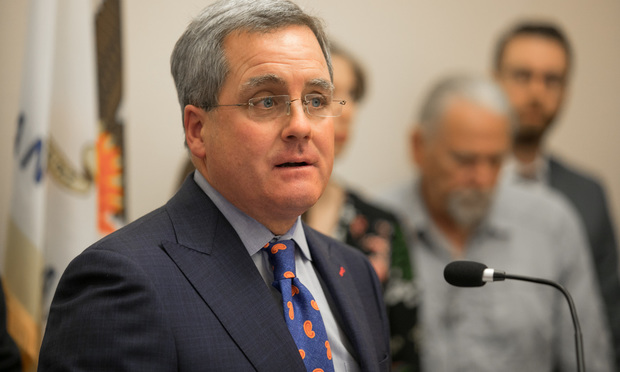New Federal "Conscience" Rule May Create Liability Concerns for Health Care General Counsel
The U.S. Department of Health and Human Services has finalized its so-called “conscience” rule that allows health care providers to “exercise their religious beliefs or moral convictions” in deciding to whom they provide care. The rule may create legal concerns for health care providers and their general counsel.
May 03, 2019 at 05:52 PM
5 minute read
 San Francisco City Attorney Dennis Herrera. Photo: Jason Doiy/ALM
San Francisco City Attorney Dennis Herrera. Photo: Jason Doiy/ALM
The U.S. Department of Health and Human Services has finalized its so-called “conscience” rule that allows health care providers to “exercise their religious beliefs or moral convictions” in deciding to whom they provide care. The rule is certain to create legal concerns for health care providers and their general counsel.
Reaction to the rule, which was finalized Thursday and will go into effect in 60 days, has been swift.
The City of San Francisco immediately filed suit asking the U.S. District Court in Northern California to declare the rule unconstitutional and seeks a court order to prevent it from taking effect.
City attorney Dennis Herrera said in a statement, “At its core, this rule is about denying people medical care. This administration is willing to sacrifice patients' health and lives—particularly those of women, members of the LGBTQ community, and low-income families—to score right-wing political points.”
Herrera continued, “People's health should not be a political football. The intent of this new rule is clear: it's to prioritize religious beliefs over patient care, thereby undermining access to contraception, abortion, HIV treatment and a host of other medical services.”
Officials at Health and Human Services told Corporate Counsel on Friday it was working on a reply, but had not yet formulated it. In a press release, it said, “The final rule fulfills President Trump's promise to promote and protect the fundamental and unalienable rights of conscience and religious liberty, a promise he made when he signed an executive order in May 2017 protecting religious liberty.”
San Francisco claimed the rule is so broad that it applies not just to doctors and nurses, but anyone related to health care, like receptionists and schedulers. “Schedulers, for example, could refuse to set appointments for LGBTQ patients or a woman seeking information about an abortion, with potentially devastating impacts on the patients' health or lives,” the city said.
If San Francisco sought to address the situation by transferring the staff person to another assignment so their professional role did not conflict with their personal beliefs, that could be considered “discrimination” against the staffer under the new federal rule.
Cities, hospitals and universities that fail to comply with the rule risk losing billions of dollars in federal money that funds everything from Medicaid and Medicare to HIV treatment to assistance for low-income families and foster children. If they do comply with the rule, they risk being sued by patients who feel discriminated against or who suffer harm or death because of the provider's refusal.
The Human Rights Campaign—the largest lesbian, gay, bisexual, transgender and queer civil rights organization in the U.S.—released a statement condemning the rule, saying it would allow providers to refuse lifesaving care to LGBTQ patients, among others.
David Stacy, government affairs director for the group, said in the statement, “The administration's decision puts LGBTQ people at greater risk of being denied necessary and appropriate health care solely based on their sexual orientation or gender identity. Everyone deserves access to medically necessary care and should never be turned away because of who they are or who they love.”
For its part, Health and Human Services framed the rule as respecting the health provider's conscience and as protecting health care providers and entities from discrimination on the basis of their beliefs. The rule would be enforced by the department's Office of Civil Rights.
Phillip Kim, associate in the Dallas office of Haynes and Boone, said general counsel are rightly concerned. The rule creates competing legal interests because it could be used against certain groups, such as gays or women. “It may be protecting the civil rights of one group” at the cost of another, he said. “It creates operational complications from a legal standpoint.”
Kim, part of the law firm's health care and life sciences group, added, “It certainly creates an area that is a bit more gray today than it was before. The situation provides for a lot of lawsuits and ethical questions, and there might be some deep soul searching that some providers will have to do.”
According to the HHS website, the rule applies to:
- HHS
- State and local governments
- Public and private health providers that receive HHS funds
- Universities and schools that provide health care training
- Individuals and entities receiving taxpayer dollars from HHS or through particular programs administered by HHS for health care services, insurance, provider licensing and research, such as through Medicare, Medicaid, Global Health Programs, the Affordable Care Act, the Public Health Service Act and HHS's annual appropriations acts.
This content has been archived. It is available through our partners, LexisNexis® and Bloomberg Law.
To view this content, please continue to their sites.
Not a Lexis Subscriber?
Subscribe Now
Not a Bloomberg Law Subscriber?
Subscribe Now
NOT FOR REPRINT
© 2025 ALM Global, LLC, All Rights Reserved. Request academic re-use from www.copyright.com. All other uses, submit a request to [email protected]. For more information visit Asset & Logo Licensing.
You Might Like
View All
Trump Taps McKinsey CLO Pierre Gentin for Commerce Department GC

GOP Now Holds FTC Gavel, but Dems Signal They'll Be a Rowdy Minority
6 minute read

Fired by Trump, EEOC's First Blind GC Lands at Nonprofit Targeting Abuses of Power
3 minute readTrending Stories
- 1ACC CLO Survey Waves Warning Flags for Boards
- 2States Accuse Trump of Thwarting Court's Funding Restoration Order
- 3Microsoft Becomes Latest Tech Company to Face Claims of Stealing Marketing Commissions From Influencers
- 4Coral Gables Attorney Busted for Stalking Lawyer
- 5Trump's DOJ Delays Releasing Jan. 6 FBI Agents List Under Consent Order
Who Got The Work
J. Brugh Lower of Gibbons has entered an appearance for industrial equipment supplier Devco Corporation in a pending trademark infringement lawsuit. The suit, accusing the defendant of selling knock-off Graco products, was filed Dec. 18 in New Jersey District Court by Rivkin Radler on behalf of Graco Inc. and Graco Minnesota. The case, assigned to U.S. District Judge Zahid N. Quraishi, is 3:24-cv-11294, Graco Inc. et al v. Devco Corporation.
Who Got The Work
Rebecca Maller-Stein and Kent A. Yalowitz of Arnold & Porter Kaye Scholer have entered their appearances for Hanaco Venture Capital and its executives, Lior Prosor and David Frankel, in a pending securities lawsuit. The action, filed on Dec. 24 in New York Southern District Court by Zell, Aron & Co. on behalf of Goldeneye Advisors, accuses the defendants of negligently and fraudulently managing the plaintiff's $1 million investment. The case, assigned to U.S. District Judge Vernon S. Broderick, is 1:24-cv-09918, Goldeneye Advisors, LLC v. Hanaco Venture Capital, Ltd. et al.
Who Got The Work
Attorneys from A&O Shearman has stepped in as defense counsel for Toronto-Dominion Bank and other defendants in a pending securities class action. The suit, filed Dec. 11 in New York Southern District Court by Bleichmar Fonti & Auld, accuses the defendants of concealing the bank's 'pervasive' deficiencies in regards to its compliance with the Bank Secrecy Act and the quality of its anti-money laundering controls. The case, assigned to U.S. District Judge Arun Subramanian, is 1:24-cv-09445, Gonzalez v. The Toronto-Dominion Bank et al.
Who Got The Work
Crown Castle International, a Pennsylvania company providing shared communications infrastructure, has turned to Luke D. Wolf of Gordon Rees Scully Mansukhani to fend off a pending breach-of-contract lawsuit. The court action, filed Nov. 25 in Michigan Eastern District Court by Hooper Hathaway PC on behalf of The Town Residences LLC, accuses Crown Castle of failing to transfer approximately $30,000 in utility payments from T-Mobile in breach of a roof-top lease and assignment agreement. The case, assigned to U.S. District Judge Susan K. Declercq, is 2:24-cv-13131, The Town Residences LLC v. T-Mobile US, Inc. et al.
Who Got The Work
Wilfred P. Coronato and Daniel M. Schwartz of McCarter & English have stepped in as defense counsel to Electrolux Home Products Inc. in a pending product liability lawsuit. The court action, filed Nov. 26 in New York Eastern District Court by Poulos Lopiccolo PC and Nagel Rice LLP on behalf of David Stern, alleges that the defendant's refrigerators’ drawers and shelving repeatedly break and fall apart within months after purchase. The case, assigned to U.S. District Judge Joan M. Azrack, is 2:24-cv-08204, Stern v. Electrolux Home Products, Inc.
Featured Firms
Law Offices of Gary Martin Hays & Associates, P.C.
(470) 294-1674
Law Offices of Mark E. Salomone
(857) 444-6468
Smith & Hassler
(713) 739-1250






